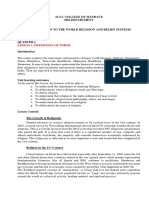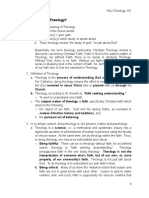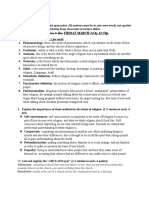0 ratings0% found this document useful (0 votes)
14 viewsJayoma J Jyan Gay D. - Christian Doctrines Seatwork 1
Jayoma J Jyan Gay D. - Christian Doctrines Seatwork 1
Uploaded by
Jyan GayThis document discusses Christian doctrines and theology. It contains questions and answers about the meanings of theology, the relationship between religious beliefs, practices, and feelings, and how faith and reason relate to religious experience. It also describes the characteristics of good Christian theology and lists the major Christian doctrines as Revelation, God, Humanity, Salvation, the Church, and the Last Things. It explains that these doctrines are all related and work together to teach the truth about Christianity.
Copyright:
© All Rights Reserved
Available Formats
Download as DOCX, PDF, TXT or read online from Scribd
Jayoma J Jyan Gay D. - Christian Doctrines Seatwork 1
Jayoma J Jyan Gay D. - Christian Doctrines Seatwork 1
Uploaded by
Jyan Gay0 ratings0% found this document useful (0 votes)
14 views2 pagesThis document discusses Christian doctrines and theology. It contains questions and answers about the meanings of theology, the relationship between religious beliefs, practices, and feelings, and how faith and reason relate to religious experience. It also describes the characteristics of good Christian theology and lists the major Christian doctrines as Revelation, God, Humanity, Salvation, the Church, and the Last Things. It explains that these doctrines are all related and work together to teach the truth about Christianity.
Original Title
Jayoma^J Jyan Gay D. - Christian Doctrines Seatwork 1
Copyright
© © All Rights Reserved
Available Formats
DOCX, PDF, TXT or read online from Scribd
Share this document
Did you find this document useful?
Is this content inappropriate?
This document discusses Christian doctrines and theology. It contains questions and answers about the meanings of theology, the relationship between religious beliefs, practices, and feelings, and how faith and reason relate to religious experience. It also describes the characteristics of good Christian theology and lists the major Christian doctrines as Revelation, God, Humanity, Salvation, the Church, and the Last Things. It explains that these doctrines are all related and work together to teach the truth about Christianity.
Copyright:
© All Rights Reserved
Available Formats
Download as DOCX, PDF, TXT or read online from Scribd
Download as docx, pdf, or txt
0 ratings0% found this document useful (0 votes)
14 views2 pagesJayoma J Jyan Gay D. - Christian Doctrines Seatwork 1
Jayoma J Jyan Gay D. - Christian Doctrines Seatwork 1
Uploaded by
Jyan GayThis document discusses Christian doctrines and theology. It contains questions and answers about the meanings of theology, the relationship between religious beliefs, practices, and feelings, and how faith and reason relate to religious experience. It also describes the characteristics of good Christian theology and lists the major Christian doctrines as Revelation, God, Humanity, Salvation, the Church, and the Last Things. It explains that these doctrines are all related and work together to teach the truth about Christianity.
Copyright:
© All Rights Reserved
Available Formats
Download as DOCX, PDF, TXT or read online from Scribd
Download as docx, pdf, or txt
You are on page 1of 2
Christian Doctrines
Name: Jyan Gay D. Jayoma Year: 1 Course: Bachelor of Science in Accountancy
Questions for review:
1. What meanings does the word theology have?
The word theology comes from the Greek words “theos” which means “God,” and
“logos” which means “speech” or “word.” Literally speaking, theology means “God-talk” or “the
language that speaks about God.” Theology, however, has different meanings. The word
“theology” is expressed and linked after the names of religious groups to designate their beliefs
such as the Seventh-Day Adventist theology, among others. Moreover, theology also refers but is
not limited to (1) the beliefs of any religious denominations; (2) the activity of reflecting on our
religious beliefs; (3) the scrutiny of our religious beliefs with the intention to express them in a
comprehensible and logical manner; and (4) anything that uses the name of God, or/and any holy
beings.
2. What is the relation between religious beliefs and religious practices and feelings?
According to the book “Reign of God” by Richard Rice, “Religion is a practice more
than a belief” and “is primarily emotional in nature.” Our religious practices and feelings are
directly connected with our beliefs since the way we feel and the way we live are reflections of
what we believe. Say, for example, you believe in the verse that is found in Matthew 7:12 which
says, “Do unto others what you want others to do unto you.” You will then start practicing
treating people the way you want to be treated as well and you will start feeling empathy toward
your neighbors.
3. How are faith and reason related to a mature religious experience?
Faith and reason complement each other since there is only a single truth. For example,
Christians believe that every “man is made out of the dust…,” (Gen. 2:19) as written in the
Bible. On the other hand, Science has proven that the elements in our body are likewise found in
the soil or dust. The more one tries to reason out everything through scientific explanations, the
more faith be proven right. And this is how faith and reason relate to a mature religious
experience. Both explain that the way we live and the things around us are planned and created
by the Lord, these two elaborate that there are so many things to be grateful for with God and
that enables us to experience Him every single day of our lives and develop our relationship with
Him through worship.
4. What are the characteristics of a good Christian theology?
Good theology is biblical, rational, historically sensitive, contemporary, creative and
constructive, systematic, and is for the church. Good theology helps strengthen our confidence in
God and makes us thirstier for biblical truths. Moreover, it binds humanity and God closer
together leading to eternity.
5. What are the major Christian doctrines and how are they related to each other?
The major Christian doctrines are the Doctrine of Revelation, the Doctrine of God
(Theology), the Doctrine of Humanity (Anthropology), the Doctrine of Salvation (Soteriology),
the Doctrine of the Church (Ecclesiology), and the Doctrine of the Last Things (Eschatology).
These doctrines are related to each other as they all contain one truth and speak about One God
and Christianity, although they do not have equal importance. If there is an absence of one of
these doctrines, its entirety will only bring people into confusion, and the goal of enlightening
humanity might be a hard task to do. Moreover, our Christian experience would not be possible
without the presence of these doctrines as they are the fundamentals of Christianity.
You might also like
- Knowing The Doctrines of The BibleDocument239 pagesKnowing The Doctrines of The Biblemrtibor82% (11)
- (Powerpoint) Introduction To World Religions and Belief SystemsDocument75 pages(Powerpoint) Introduction To World Religions and Belief SystemsAdrian Dionisio100% (20)
- God the Father Almighty: A Contemporary Exploration of the Divine AttributesFrom EverandGod the Father Almighty: A Contemporary Exploration of the Divine AttributesRating: 4 out of 5 stars4/5 (4)
- (Powerpoint) Introduction To World Religions and Belief SystemsDocument30 pages(Powerpoint) Introduction To World Religions and Belief SystemsAdrian Nicole Dionisio100% (2)
- Comparative Study of ReligionDocument18 pagesComparative Study of ReligionJunior MirandaNo ratings yet
- Arquivos GeraisDocument260 pagesArquivos GeraisJesiel Cesar Facundo100% (6)
- Phoenix Journal We Shape Our Future PDFDocument24 pagesPhoenix Journal We Shape Our Future PDFbronxpNo ratings yet
- Ecclesiology Topic 1 - Introduction To Ecclesiology and The Nature of The ChurchDocument19 pagesEcclesiology Topic 1 - Introduction To Ecclesiology and The Nature of The ChurchEdward DanielNo ratings yet
- Systematic Theology TH 502Document42 pagesSystematic Theology TH 502RevdKenneth Obinna IkehNo ratings yet
- The Concept of God / Divine: Humanity'S Search For GodDocument15 pagesThe Concept of God / Divine: Humanity'S Search For GodJaneth Louie ManatadNo ratings yet
- Q1 W1 L2 Understanding The Nature of ReligionDocument14 pagesQ1 W1 L2 Understanding The Nature of ReligionHeron LacanlaleNo ratings yet
- Christian and Secular EthicsDocument17 pagesChristian and Secular EthicsBogdan Sopterean100% (1)
- Part 2 EditedDocument10 pagesPart 2 EditedLando Amit FeisalNo ratings yet
- Unit 2 Lesson 4Document7 pagesUnit 2 Lesson 4Rhea BadanaNo ratings yet
- How God Changes Your BrainDocument8 pagesHow God Changes Your BrainJoelHernandezGonzalez100% (1)
- Speaking of God: An Introductory Conversation about How Christians Talk About GodFrom EverandSpeaking of God: An Introductory Conversation about How Christians Talk About GodNo ratings yet
- Foundation For Study of TheologyDocument6 pagesFoundation For Study of TheologyVivek Ray100% (2)
- Without Absolutes, God Is Not God: An Anthology of ReflectionsFrom EverandWithout Absolutes, God Is Not God: An Anthology of ReflectionsNo ratings yet
- Research Paper About Faith in GodDocument7 pagesResearch Paper About Faith in Godc9j9xqvy100% (1)
- What Is Process TheologyDocument24 pagesWhat Is Process TheologyHoward Karesh100% (2)
- Tugas ReligionDocument5 pagesTugas ReligionadisetiawanNo ratings yet
- Moral Theology (Part 1)Document54 pagesMoral Theology (Part 1)Riza Mae Merry100% (1)
- Disability, Providence, and Ethics: Bridging Gaps, Transforming LivesFrom EverandDisability, Providence, and Ethics: Bridging Gaps, Transforming LivesNo ratings yet
- Introduction To World ReligionDocument26 pagesIntroduction To World ReligionSamantha PrimNo ratings yet
- An Introduction To TheologyDocument8 pagesAn Introduction To TheologyMark PitNo ratings yet
- Experience With Theology Essay AssignmentDocument4 pagesExperience With Theology Essay Assignmentjenkennedy2323No ratings yet
- IRS3E Module 2-5E Method (The Catholic Religion and Interreligious Dialogue)Document21 pagesIRS3E Module 2-5E Method (The Catholic Religion and Interreligious Dialogue)Marianna MonfortNo ratings yet
- Bit CollegeDocument11 pagesBit CollegeReedvejee Hermoso KiamcoNo ratings yet
- What Is Theology?Document4 pagesWhat Is Theology?Sean WilliamsNo ratings yet
- Research Paper Topics On JesusDocument7 pagesResearch Paper Topics On Jesusfvjebmpk100% (1)
- PRETENIENTETE40Document68 pagesPRETENIENTETE40weebmyphone11No ratings yet
- Living Under God's Law - Christian EthicsDocument352 pagesLiving Under God's Law - Christian Ethicsjoeschmuckitelli100% (1)
- God and Human Life #1Document3 pagesGod and Human Life #1Kwason TaylorNo ratings yet
- Topic 2 Theories Underpinning The Teaching of REDocument11 pagesTopic 2 Theories Underpinning The Teaching of REsiphiwo dlaminiNo ratings yet
- Religion 101Document39 pagesReligion 101Nguyễn Thành Minh TâmNo ratings yet
- Anderson Intimacyparameters Ets 2006Document10 pagesAnderson Intimacyparameters Ets 2006Ivonnie RenitaNo ratings yet
- Theology and EthicsDocument3 pagesTheology and EthicsBen80% (5)
- Christian EthicsDocument9 pagesChristian Ethicsogayonselle08No ratings yet
- Introduction To Christian TheologyDocument21 pagesIntroduction To Christian TheologyTOM DAVISNo ratings yet
- Thesis Statement On Religion in America Will Be The Focus of This PaperDocument4 pagesThesis Statement On Religion in America Will Be The Focus of This PaperWriteMyPaperApaStyleSingapore100% (2)
- God's Lordship in Interpretation - Vern Sheridan Poythress: 1. The Enlightenment Desire For Religiously Neutral ExegesisDocument32 pagesGod's Lordship in Interpretation - Vern Sheridan Poythress: 1. The Enlightenment Desire For Religiously Neutral ExegesisbingyamiracleNo ratings yet
- All Lecture. Doing TheologyDocument11 pagesAll Lecture. Doing TheologyJubillee MagsinoNo ratings yet
- Christian Doctrine TheismDocument13 pagesChristian Doctrine Theismmariocle2692No ratings yet
- The Psychology of Religion and Spirituality Yes and NoDocument15 pagesThe Psychology of Religion and Spirituality Yes and NoCarolina ZimmerNo ratings yet
- Baylor University George W. Truett Theological SeminaryDocument24 pagesBaylor University George W. Truett Theological SeminaryElí GutierrezNo ratings yet
- 07 - Chepter 2Document46 pages07 - Chepter 2Shalini DhalNo ratings yet
- Chapter 9. - The God of Our Lord Jesus ChristDocument29 pagesChapter 9. - The God of Our Lord Jesus Christtruthwarrior007No ratings yet
- Branches of TheologyDocument3 pagesBranches of TheologyMamang Sorbetero100% (5)
- Q1 Week1 - Topic 2Document25 pagesQ1 Week1 - Topic 2Generoso C. ZaradollaNo ratings yet
- OrthopraxisDocument2 pagesOrthopraxisMarcos GarcíaNo ratings yet
- Systematic TheologyDocument7 pagesSystematic Theologyotisburns50% (2)
- Christianity Research Paper TopicsDocument5 pagesChristianity Research Paper Topicsoppfaztlg100% (1)
- DocumentDocument5 pagesDocumenthauwau yusufNo ratings yet
- Intro To Religion Spring 17 Mid Term OfficialDocument5 pagesIntro To Religion Spring 17 Mid Term OfficialGalo IngaNo ratings yet
- The Trinity among the Nations: The Doctrine of God in the Majority WorldFrom EverandThe Trinity among the Nations: The Doctrine of God in the Majority WorldNo ratings yet
- Portfolio in Introduction To World Religion AND Belief SystemDocument28 pagesPortfolio in Introduction To World Religion AND Belief SystemNatasha Mae BatagNo ratings yet
- Jayoma J Reading Log LN4Document3 pagesJayoma J Reading Log LN4Jyan GayNo ratings yet
- 4 5Document7 pages4 5Jyan GayNo ratings yet
- Wad - Group #6 - StewardshipDocument24 pagesWad - Group #6 - StewardshipJyan GayNo ratings yet
- Chapter 12Document10 pagesChapter 12Jyan GayNo ratings yet
- First Mohonk Conference On The Negro QuestionDocument148 pagesFirst Mohonk Conference On The Negro QuestionAsanijNo ratings yet
- Revelation and History: Schelling, Mohler and Congar: Thomas F. O'MearaDocument19 pagesRevelation and History: Schelling, Mohler and Congar: Thomas F. O'MearaLucasNo ratings yet
- Corporate WorshipDocument2 pagesCorporate WorshipJoas Caesar DalionNo ratings yet
- What Is Revival?Document2 pagesWhat Is Revival?tsupasat100% (1)
- Foundation of Islamic Study Module 1 (2/5)Document13 pagesFoundation of Islamic Study Module 1 (2/5)Ahmed Abd El HamedNo ratings yet
- Oneness BelieversDocument94 pagesOneness Believersacts2and38No ratings yet
- Script Senior Scout INVESTITURE CeremonyDocument8 pagesScript Senior Scout INVESTITURE Ceremonychristopher rabaraNo ratings yet
- As The Gods Demand (Digital Pages) (2022-02-19)Document24 pagesAs The Gods Demand (Digital Pages) (2022-02-19)massuro100% (1)
- CANON LAW People of GodDocument5 pagesCANON LAW People of Godfopio917No ratings yet
- Essay Hellenized JewsDocument7 pagesEssay Hellenized JewsDaniel BellNo ratings yet
- God Writes Straight With Crooked Lines - Levinas On Agape Without ErosDocument16 pagesGod Writes Straight With Crooked Lines - Levinas On Agape Without ErosChristian EspirituNo ratings yet
- The Real You: Believing Your True IdentityDocument15 pagesThe Real You: Believing Your True IdentityLindaBreitmanNo ratings yet
- Remarks To Baltimore Presbyterian SynodDocument4 pagesRemarks To Baltimore Presbyterian Synodapi-309780296No ratings yet
- God Is Gay - Authorized ShareDocument155 pagesGod Is Gay - Authorized ShareDavid Muñoz AmbrizNo ratings yet
- The Essential Newness of The New Creation - T. Austin-SparksDocument27 pagesThe Essential Newness of The New Creation - T. Austin-SparksAlberto GolizNo ratings yet
- The Nature of Christian Separation PDFDocument2 pagesThe Nature of Christian Separation PDFMicahhackettNo ratings yet
- The Mystery of Redemption - Vladimir MossDocument87 pagesThe Mystery of Redemption - Vladimir MossIgnacio Pérez BorgarelliNo ratings yet
- Reflection Paper (August)Document2 pagesReflection Paper (August)Gao DencioNo ratings yet
- Change Into His ImageDocument5 pagesChange Into His ImageChess PinNo ratings yet
- Prayer For Acquaintance PartyDocument2 pagesPrayer For Acquaintance PartyClaChristina50% (2)
- Choosing Songs For WorshipDocument1 pageChoosing Songs For WorshipHaleiousNo ratings yet
- Does Seventh-Day Adventism Teach The Trinity?Document184 pagesDoes Seventh-Day Adventism Teach The Trinity?JeremyGrahamNo ratings yet
- New Text DocumentDocument10 pagesNew Text DocumentFitzgerald KeaneNo ratings yet
- Discussing Osho's Concept: Astrology: The Science of Cosmic Oneness.'Document14 pagesDiscussing Osho's Concept: Astrology: The Science of Cosmic Oneness.'Kareppa LimbigidadNo ratings yet
- Theology 104. NOTESDocument43 pagesTheology 104. NOTESDhen MarcNo ratings yet
- Problems of Religious Pluralism (PDFDrive)Document157 pagesProblems of Religious Pluralism (PDFDrive)Bobby SamuelNo ratings yet
- A Prayer of Submission and ObedienceDocument3 pagesA Prayer of Submission and ObedienceLindaLindyNo ratings yet
- A Brief Treatise of KnowingDocument89 pagesA Brief Treatise of KnowingJoão VítorNo ratings yet





























































































